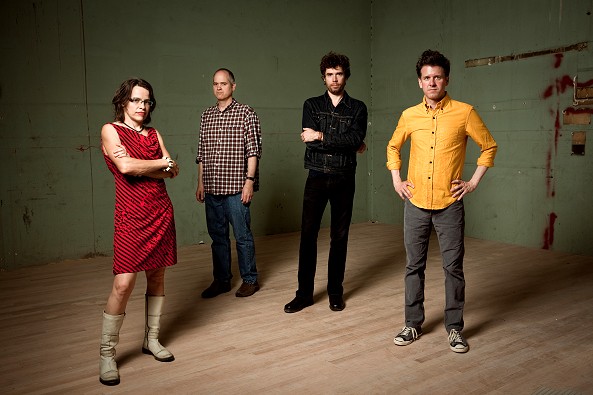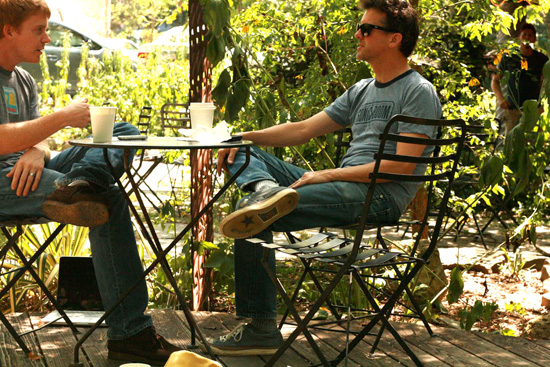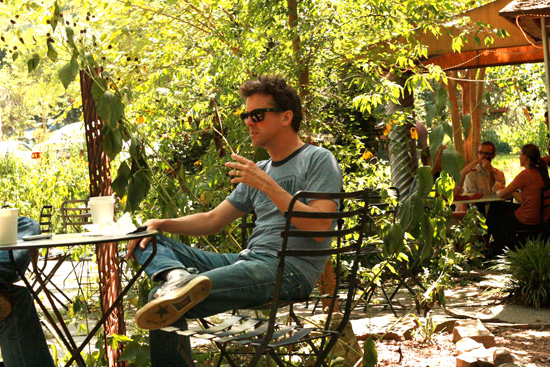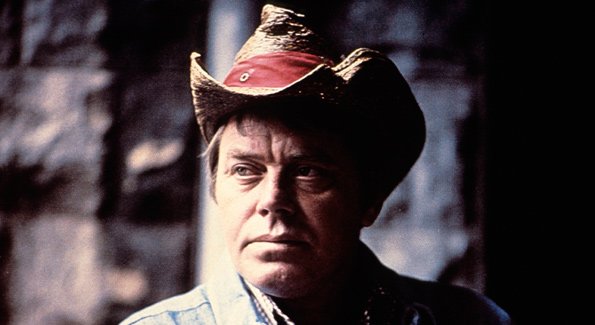Videos by American Songwriter
Skip Matheny— currently a songwriter in the band Roman Candle and former bartender in a retirement community — caught up with Mac McCaughan recently in Chapel Hill, NC, before the release of Majesty Shredding, Superchunk’s acclaimed new album, and their first since Here’s to Shutting Up nine years ago. Superchunk live dates follow the interview as well as a video of the band performing Precision Auto on Jimmy Fallon.
(all below photo credits: Timshel Matheny)
I read somewhere that you tend to write lyrics quickly.
It’s usually pretty fast once a song gets started, maybe once I have a chorus or once I have a verse. Occasionally I will get stuck with like three-quarters of it and need another verse, but usually once there’s a concept or an idea, I can find words for the rest of the song. It just kind of starts with singing melodies and maybe trying to get a chorus first, or maybe the first line of the song. And that can take a while, just to be sure about that.
It’s interesting that getting the first line right can take you so far into writing the rest of the song. There seem to be several Superchunk songs where the tone, for the lyrics at least, is set up in some really specific or descriptive first line. Like the girl fumbling with her lighter at the beginning of Act Surprised.
A lot of times things start by – Either me thinking of something really specific like a detail about something, and starting the song with that. Or having a chorus that’s maybe a little bit more [abstract], like you don’t really know, it could be referring to anything. Then when I’m working on the verses, I’ll try to come up with specifics and details that make [the chorus] more connected to the real world, as opposed to, all kinds of vague feelings. To me, when I can come up with a few things like that in a song, then I really start to feel good about it being, if not done, then on its way.
On the new record (Majesty Shredding), and on most of you records, there always seem to be well-placed, concrete particular things, whether it’s a propane tank or somebody writing a name on a streaked bathroom mirror. When you are writing do those kind of concrete details just come out naturally? Or is there a more of a conscious effort to describe things through these details?
Yeah, I think that it can get to a certain point [while writing] and I think, ‘you know this is still kind of all vague and there is nothing grabbing you.’ I mean sometimes it’s the detail that starts out the song and then that sort of takes care of itself. But like I said, sometimes you’ll have a chorus that’s a good chorus but it doesn’t necessarily mean anything until there is context. I’ve had this discussion with people about lyrics where they ask “Do you really think that?” or “Were you really that depressed” [laughs] No I mean I guess I was for a minute when I had the idea to write the song, but that’s all it really takes. It’s like you really only have to be in a certain mindset for as long as it takes to write that thing down. And then after that it kind of exists on its own. It’s not like “Now I’m living this” [laughs].
Occasionally some of the phrasing in your lyrics take on very poetic structures. One example I was thinking of is at the end of the song “Late Century Dream”:
“ But everybody grows up weened on some sick late century dream / Or the happy face on a shirt smiling.”
It creates a really interesting tension between the text itself and how the words fit as they are sung into the song. Is this just the way you write? Or is this something you experiment with on purpose?
I think its just the way that I write and I think in most cases the structure of the words ends up being dictated by the music. But I’m a big fan of people like the Go-Betweens, Grant McLennan and Robert Forster. Their music had some twists and turns also, but it was guitars bass and drums and maybe some violin. And it was very pleasant to listen to. There was nothing difficult going on in there. But then the words were often slightly awkward in this way that I really like. It’s just kind of obvious I guess, if something is too easy, it’s kind of boring – if everything fits right where it should be in terms of syllables on the beat. I prefer stuff that’s a little bit surprising, and not in a way that feels forced or gimmicky. Because our music is pretty normal. But I think occasionally if there’s something that makes you pay attention because it’s a little bit different or you feel like the song is going in one direction. But then — ending a line in a certain way, by going up or down, or by adding another word at the and or something it can change your perception of what you thought you were listening to. But it’s not something that I’m sitting down and saying “I have to remember to do that” [laughs]. It just happens I think.
I imagine if you are aware of those type of distinctions, they probably show up naturally in the writing. As opposed to deliberately thinking “I should try to make this part a bit obtuse or hard-to-decipher.”
Sometimes though, I do go the other way where, even if we’ve been playing or rehearsing the song already, and you think its done, something will feel off, or forced sounding. I think sometimes it’s good to put something, even if it’s one line, back in a more normal place, so that the whole thing just feels more natural. It’s funny because i sent an mp3 of the first song on the new record “Digging for Something” to someone I have known for a long time, and they said, “Wow it’s great. The chorus is almost too catchy, then it’s balanced out by this slightly melancholy thing that’s happening elsewhere in the song.” It’s true you can have something that is too on-the-nose, melodically or lyrically or whatever. And our songs are meant to be catchy. They’re not supposed to be an exercise to listen to. But I think there does need to be a balance of tension and release.
I would imagine a ton of things changed in the nine years between this record and “Here’s to Shutting Up.” How did the writing of the songs on Majesty Shredding go?
Once we agreed this would be a good year to try and make a record, and all the details were discussed, and we knew we could be moving forward with it, it made writing the songs a lot easier. Because I knew what I was writing them for. For a long time I knew that we weren’t making a new Superchunk record so I could just say “Ok I’m working on the new Portastatic record now. But after I finished “Be Still Please” I felt like I was done with that for a while. So in that situation its harder to just say I’m just going to go randomly write songs, for me anyway.
For me it’s easier to know where the songs are going what they are destined for. And it coincided with my home studio being done because it used to be in the bedroom where now our son is sleeping. So I didn’t have a studio for a while and I was renting a little office space in Carrboro over the Orange County Social Club. And I had written some Portastatic music there but having the home studio made it so much easier to go downstairs and write and record demos.
Did the arrangements for the songs change much once you were playing them in the studio as a band?
Yeah we learned the songs for the new record so fast. I wrote them and then sent everybody demos. And then we learned them in a couple days playing together before we went into the studio. And then we would track three or four songs, the basics in two days, and that would be a session. Then I would take them home and finish the songs at home in my studio and then send them off to Scott Solter who would mix them. And so we did that three or four times over the course of the year, and then that was the record. But because we were learning them so fast, we were adding things like that in the studio [at the last minute]. You know if we got to a transition going from a chorus back into a verse — if it just seemed too simple, or too obvious what was coming next — at that stage we were still adding things. “What if we added this extra chord before going back to the next part?”
Sometimes you can try that, and it just sounds like that’s what you did. It just sounds too “why did you do that? It’s not needed there.” But other times it totally works. I mean we have so many songs. I think that without trying to do things in a totally different way, like in other words if we went in one day and said “Ok we’re going to roll dice to determine whatever the next chord is.” Short of doing that, you’re bound to have a certain way of doing things at this point, you know, 21 years into doing this. So there’s definitely times when we’re working a song and we’ll say “what if the bridge was this?” And then someone else will say “We already did that on…” [laughs] Or I will send a demo and say “You know it’s driving me crazy, I feel like this part sounds like another song of ours but I can’t figure out which one…” And sometimes it’s not another song. But sometimes Jim Wilbur will email me back and say “Well it sound like five of our songs. Here’s one in particular. [laughs] …Change it.”
You’ve managed to write and record a prolific amount of music over the last twenty years, especially considering all the work that has gone into Merge. Do you have any particular writing habits?
Do you know Kurt Wagner [of Lambchop]? He lives in Nashville. At one point he gave himself this project where he had to write a song everyday for a year I think. I don’t know if he actually wrote 365 songs in a row, but you know, he could. Anyway I’ve used that idea before especially once we had kids and my time was so much more limited for me to just mess around. It became much more like “If you have 3 hours you have to get something done.” I think I still have that mindset, if there’s a night I can set aside [to write], I will try to finish a song by the end of the night. Because if I leave the studio and I don’t have anything recorded, then it’s like I’ve wasted all that time. Even if its something I don’t go back to, it’s something. So a lot of these songs were written like that, just sitting down starting to write maybe with one line already in mind but no music — or with nothing in mind.
And so a lot of times the songs end up being a little bit weird because they are recorded before I even know it that well, you know. And so I just kind of play it how I think it is going to go and then sometimes I will get to a part where I forget I was going to do and then I’ll just…do something else. So I don’t have to like stop and start again. And a lot of those parts end up being in there because it’s kind of like, you know..’once they’re recorded..’ It’s too much trouble to go back and change it. Because you get used to hearing it a certain way. Even if you start out saying like, ‘yeah I gotta fix that outro at some point’ you know.. But once you have heard it like thirty times and you are writing the lyrics it just sort of becomes the song. A lot of the songs are like that. A lot of the demos are like the first time I was ever playing it all the way through. And then that’s kind of how they stayed. It doesn’t always work like that but it is kind of good when it does cause, you know, I think a lot of times it sounds the most natural that way because you are not going back messing with it.
Did your parents expose you to a lot of music or was it something you came to on your own when you were younger?
No they definitely listened to a lot of music. My Dad had a lot of records. And they encouraged us to play music in school band and things like that. My brother was a music major at UNC and he’s been playing [drums] with Bon Iver which is really cool. But yeah they definitely encouraged it. Both when we were little, listening to their records, and then playing in the school band, and then in high school going to see bands. They were very supportive of that. I mean, to a point you know. When you start saying “I want to drive to the 930 club on a school night to see a band.” It’s more like “I don’t know if that’s going to happen every time.”
There’s a part in “Detroit Has a Skyline too” which has some of the more poetically condensed lines I’ve heard in a long time:
There was no architect designed this view
He could not have known about you
Mouse homes, catacombs, Detroit has a skyline, too
The song is describing a scene very well up to that point anyway, with the guy drinking cans of beer to get to sleep, and listening to the same songs on repeat. But then the guy (in the song) lists these three peculiar off-hand things which are all oddly connected through ideas of structure and decay. Mouse homes are these incredibly transient, made-out-of-garbage, blowaway, natural things. And catacombs are elaborate underground homes for things already dead, and skylines are these above-ground abstractions, that ‘house” or contain these half-planned, half-sprawled giant buildings. Unfortunately with Detroit’s skyline, the word decay comes to mind pretty quickly. All of the sudden the listener is taken out of whatever room that the guy is drinking beer in, and run through portions of the beginning middle and end of modern man [laughs]. It’s a deceptively simple song, that really repays attention. Lyrically do you have any poets or books that you read, that you might think influence you in an indirect way?
[laughs] I’m glad it comes off that way. I can’t claim that I planned it to. I really enjoy reading poetry though I don’t really feel like I totally understand it. Well like any kind of art, I think its best, for me anyway, if I don’t try to understand it [laughs], if I’m just reading it and enjoying it for whatever I am getting out of it. But I don’t really think about that when I am writing songs at all. Maybe some people do, but for me if I decided to start using some structures or ideas from a Robert Creeley or a John Ashberry poem, I’d end up with a song that didn’t work as a song. I think that anything you listen to or read or whatever influences you in some way, but not in a conscious way. I’ve actually got a book of Robert Creeley by the bed. I think its possible if you are stuck on something to listen to other people’s music. Just going to listen to a Bob Dylan record or a Pavement record or like I said, a Go-Betweens record, or the Verlaines. You are never going to write a song like those [songs], or in the style of those people, but it just gets you out of a certain track of thinking if you are stuck. It clears the air or something.
I think when you are writing a song, so often you are dealing with an economy of syllables anyway, so if you can just get three new words that pull you out of whatever spot you are in, then maybe you are in a brand new room so to speak.
Yeah, reading John Cage poetry is another example because its so all over the place and non-linear. You can’t keep thinking the way you are already thinking, and get through it.
I imagine the mindset is incredibly different between writing for a Superchunk record and the writing you’ve done for Portastatic records over the years. When you are approaching a blank tape or a blank page, more often than not, are you already coming to the song with certain ideas, and trying to work them out through a song? Or do you ever have the experience of listening to particular tones or sounds that evoke ideas or directions that you didn’t know you wanted to write about?
I think a lot of times the sounds. That is one of the things that kind of got Portastatic started. Because I was doing Superchunk at the time and I got a guitar at some thrift shop when we were on tour I think it was a Hohner. You know, just a cheap ’60s plastic guitar. I think if you just pick up a guitar that is really different or any kind of instrument that is really different than what you are used to, it just generates songs because the sound is so different. You just want to play different things on it. So I mean that was kind of how Portastatic started – that guitar and some keyboards I had got and some old synthesizers and stuff. I think a lot of times, especially if you know sort of what the eventual setting of the song is gonna be I think the sounds sort of steer the song in one direction or another.
The Superchunk records have such a different kind “eventual setting” like you say – Not to say that you guys might not come out with a record next year that is all pianos and breaking glass – but from a lyrical approach I was wondering how it works. When you write lyrics are you kind of going to the same spot in your head for both?
[laughs] Right. I dont know. I think the Portastatic ones do tend to be kind of different and I am not sure exactly how to quantify it but. Maybe it is just ’cause the music is different and so it lends itself to a different thing . But I think it does tend to be different. With Superchunk, knowing kind of what the band is like and knowing how everybody plays in the band you can kind of have an idea of what it is going to kind of sound like and what goes with that. And also I think with Superchunk I am writing all of the words but I am singing in front of a band that is the same four people all of the time. So you are representing something different than with a Portastaic record, I mean I could just be me by myself playing all those songs or the line-up is always changing all the time. So I think it is a little but different when you are singing something as ‘you’ versus as part of a band that has the same members in it all the time.
Are there any songwriters you really enjoy that people might not typically expect? Like maybe Gus Kahn or the guys behind Bell Biv DeVoe? Or is there anybody that you think, “This person is a really good writer but people don’t usually think of them that way?”
[laughs] Wow. Bell Biv DeVoe. Whenever I hear that all that I can think of is that Kids in the Hall sketch. Do you know that one?
No I haven’t seen it.
Oh you gotta look it up on line because I am sure there is a video of it somewhere. He just keeps saying Bell Biv DeVoe over and over and over again. Wow. I mean I think that it is probably just a lot of the people that you would think. I mean I think someone like David Kilgour is pretty underrated. Simply because The Clean are kind of an iconic band, certainly an iconic band in New Zealand, and I think probably around the world they kind of represent New Zealand music. I think a lot of what people love about them is the sound. And their songs as well but I feel like he doesn’t get enough credit for how sneaky his songs are in the sense that some of them are very pretty, and some of them kind of float by and then you hear a guitar solo and it’s kind of amazing, and there are never a ton of words. So they can be really low impact at first. But the combination of the words that he is saying with the voice and the guitar sound and everything, I mean there is really nothing else that sounds like it. Even though if you just describe the elements it doesn’t sound incredibly unique, you know what I mean? Guitar bass drums trio. But all three of them are songwriters in their own right. And I think Bob (Robert Scott), in some ways is known as more the songwriter because he has made so many records with The Bats, and solo records, and The Magick Heads and all these things. And David is known more as a guitarist.
But his solo records – what’s amazing is that he has made a lot of them and I can just go to any of them at any time and it is not like “Oh I am not in the mood for that one” it’s like ‘give any of them to me.’ So I mean it is not something new. He has been around for a while but I think it is something that, to me, I think people overlook. But I think that a lot of the stuff I like is the stuff that everybody likes. Springsteen, you know, the Go-Betweens, Bob Dylan. I think that sometimes a band like Yo La Tengo and Georgia and Ira and James don’t get recognized as much for songwriting. Because so much of what they do is so sonically imposing. But when you see them live and so many of those songs [are played] acoustic – that on the record were just these insane jams – you realize how strong the songs are.


















Leave a Reply
Only members can comment. Become a member. Already a member? Log in.